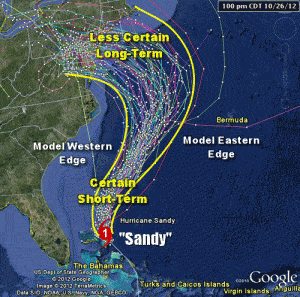With respect to the science of climate change, many experts regard the Intergovernmental Panel on Climate Change as the world’s authoritative institution. A draft summary of its forthcoming report was leaked last week. It describes the panel’s growing confidence that climate change is real, that it is a result of human action, and that if the world continues on its current course, it will face exceedingly serious losses and threats (including a significant rise in sea levels by century’s end).
While the draft report states these conclusions with unprecedented conviction, they are broadly consistent with the panel’s judgments from the past two decades, which raises an obvious question: Why have so many nations (including China and the U.S., the world’s leading greenhouse-gas emitters) not done more in response?
There are many answers. Skeptics say that the IPCC is biased and wrong. Companies whose economic interests are at stake continue to fight against regulatory controls. The leaders of some nations think that if they acted unilaterally to reduce their emissions, they would impose significant costs on their citizens without doing much to reduce climate change. Especially in a difficult economic period, they don’t think it makes sense to act on their own.
To this extent, the real challenge lies in producing an international agreement. It isn’t easy to obtain a consensus on the timing and expense of reductions, especially because developing nations (including China) insist that developed nations (including the U.S.) are obliged to take the most costly steps toward reducing emissions.
Psychological Barriers
All of these positions play a major role. But we should not disregard purely psychological factors. An understanding of what human beings fear — and what they do not — helps to explain why nations haven’t insisted on more significant emissions reductions.
The first obstacle is that people tend to evaluate risks by way of “the availability heuristic,” which leads them to assess the probability of harm by asking whether a readily available example comes to mind. An act of terrorism, for example, is likely to be both available and salient, and hence makes people fear that another such event will occur (whether it is likely to or not). So, too, a recent crime or accident can activate attention and significantly inflate people’s assessment of risk.
By contrast, climate change is difficult to associate with any particular tragedy or disaster. To be sure, many scientists think that climate change makes extreme weather events, such as Hurricane Sandy, substantially more likely. But it is hard to prove that climate change “caused” any particular event, and as a result, the association tends to be at best speculative in many people’s minds.

Second, people tend to be especially focused on risks or hazards that have an identifiable perpetrator, and for that reason produce outrage. Warmer temperatures are a product not of any particular human being or group, but the interaction between nature and countless decisions by countless people. There are no obvious devils or demons — no individuals who intend to create the harms associated with climate change. For terrorism, a “we- they” narrative fits the facts; in the context of climate change, those who are the solution might well also be, or seem to be, the problem. In these circumstances, public outrage is much harder to fuel.
Third, human beings are far more attentive to immediate threats than to long-term ones. Behavioral scientists have emphasized that in their private lives, people sometimes display a form of myopia. They may neglect the future, seeing it as a kind of foreign country, one they may not ever visit. For this reason, they might fail to save for retirement, or they might engage in risk-taking behavior (such as smoking or unhealthy eating) that will harm their future selves.
Future Threat
In a political context, citizens might demand protection against a risk that threatens them today, tomorrow or next month. But if they perceive climate change as mostly a threat to future generations — if significant sea-level rises seem to be decades away — they are unlikely to have a sense of urgency.
Climate change lacks other characteristics that spur public concern about risks. It is gradual rather than sudden. The idea of warmer climates doesn’t produce anger, revulsion or disgust. Depletion of the ozone layer was probably the most closely analogous environmental concern; public attention to that problem was easier to mobilize because of fears of a huge rise in skin cancer.
In this light, it should not be surprising if people don’t get much exercised by the IPCC’s forthcoming report. All the obstacles are daunting — skepticism about the science, economic self-interest, and the difficulties of designing cost-effective approaches and obtaining an international agreement. But the world is unlikely to make much progress on climate change until the barrier of human psychology is squarely addressed.
Cass R. Sunstein, the Robert Walmsley University professor at Harvard Law School, is a Bloomberg View columnist. He is the former administrator of the White House Office of Information and Regulatory Affairs, the co-author of “Nudge” and author of “Simpler: The Future of Government.”
(Editors: Katy Roberts, Brooke Sample.)
Was this article valuable?
Here are more articles you may enjoy.

 Navigators Can’t Parse ‘Additional Insured’ Policy Wording in Georgia Explosion Case
Navigators Can’t Parse ‘Additional Insured’ Policy Wording in Georgia Explosion Case  FM Using AI to Elevate Claims to Deliver More Than Just Cost Savings
FM Using AI to Elevate Claims to Deliver More Than Just Cost Savings  Credit Suisse Nazi Probe Reveals Fresh SS Ties, Senator Says
Credit Suisse Nazi Probe Reveals Fresh SS Ties, Senator Says  Portugal Rolls Out $2.9 Billion Aid as Deadly Flooding Spreads
Portugal Rolls Out $2.9 Billion Aid as Deadly Flooding Spreads 